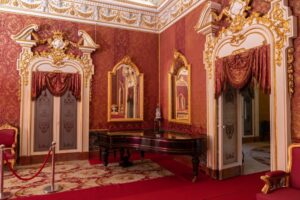Patrician Michelangelo Libertini di S. Marco did not limit himself to commissioning all the furnishings of the Palazzo from France; he also ordered a magnificent grand piano from the renowned Pleyel company, along with harps and other instruments, so that musical entertainment could be enjoyed in the Representative Halls.
The rare and valuable Pleyel Wolff Grand Piano has survived to the present day, and during the transition of the residence between Arch. Alvise Spadaro Gravina and Lawyer Lara Gravina di Belmonte Beaumont, it was donated to the latter by Arch. Spadaro as a sign of sincere affection and esteem.
The piano had “severe signs of aging,” but during the lockdown, thanks to the efforts and determination of Lawyer Gravina’s mother, Donna Gemma, it underwent an extensive conservation restoration lasting over a year by the Paolo Toscano Pianoforti company, during which all the original parts (strings, hammers, and ivory keyboard) were fully restored, bringing it back to life. Due to its age, the piano has received and maintains a tuning slightly below the current standard of 440Hz, allowing for satisfactory use in concerts and for accompanying opera singers.
Family records indicate that Richard Wagner, during a visit to Ramacca to see his stepdaughter Blandine, granddaughter of Franz Liszt, who was engaged and later married to Biagio Gravina di Ramacca, related to Lawyer Gravina’s grandfather, also visited Caltagirone and played this splendid instrument, now located in the Hall of Mirrors.
Furthermore, studies have shown that this piano is identical and contemporaneous with the grand piano made by Pleyel Wolff specifically for the great Gioacchino Rossini, now housed at the Conservatory of Pesaro. The two pianos share another coincidence: they were both restored during the same period!

